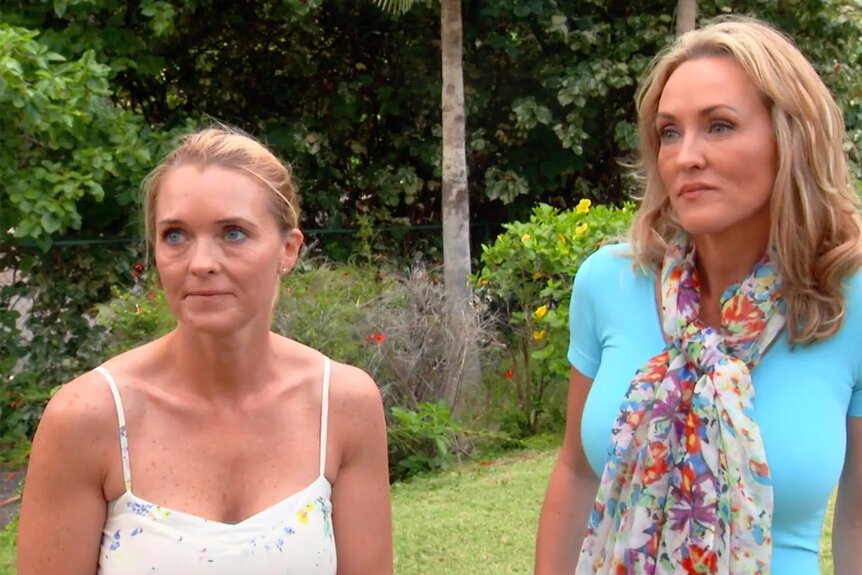Create a free profile to get unlimited access to exclusive videos, breaking news, sweepstakes, and more!
Woman Seemingly Leaves Ominous Clue For Her Daughters, But Was Her Death Actually A Murder?
Shirlene VanGundy's daughters have been on a quest for justice for more than two decades after promising their mother they would investigate if anything ever happened to her.
The envelope was labeled “baby pictures.”
But what Shirlene VanGundy’s two daughters discovered inside was something much more ominous that would launch a more than two decades-long quest to keep a promise to their mother.
The envelope contained notes allegedly written by Shirlene's husband, Ken Wakisaka, for an anger management class.
“It was actually a journal of all the different ways he abused her,” Shirlene's daughter Tammie Concord told “Dateline: Secrets Uncovered,” airing Wednesdays at 8/7c on Oxygen.
The notes, allegedly written in Ken’s hand, divulged past violent episodes.
“I have spit at Shirlene ... I have pushed Shirlene," he allegedly wrote, according to the documents obtained by "Dateline: Secrets Uncovered."
Shirlene's other daughter Tiffany Young told "Dateline" correspondent Keith Morrison that their mother had told the girls to ask Wakisaka for the “baby photos” if anything happened to her.
“She said if anything is ever to happen to me, I want you to ask Ken for your baby pictures, remember that, OK? Just remember that,” Young recalled.
It wasn’t the only ominous message that Shirlene VanGundy — also referred to as Shirlene Wakisaka — had given her daughters. The year before her April 2000 death while they were in Hawaii visiting her, she asked them to make her a promise.
“She said, ‘Promise me, if anything every happens to me, you’ll investigate,’ and we said ‘Mom, what are you talking about, if anything happens to you?’ 'Just promise me,’ she said,” Concord recalled.
The words came back to the sisters after Shirlene was rushed to the hospital just after 2 p.m. on April 5, 2000. She was put on life support as the hospital treated her case as a possible drug overdose.
Earlier that morning, Concord had contacted her mother after getting a series of calls from her the night before.
Wakisaka answered the phone and allegedly told Concord that he didn’t “know what’s wrong with your mother” before he put Shirlene on the phone.
When Concord asked if she was OK, Shirlene responded,“I love you.”
“Her words were very drawn out and slurred like I’d never heard before,” Concord said. “I was in a panic.”
An ocean away at the time, Concord called the Honolulu Police Department, who sent an ambulance to the apartment around 6 a.m.
The EMS report obtained by “Dateline: Secrets Uncovered” indicated that Shirlene was “conscious but under emotional distress” and “would not acknowledge our presence.”
“Her spouse informed us she may have taken some Aleve aspirin with two beers,” responders wrote in the report, noting “there were no empty containers of beer present and no odor of alcohol on the patient.”
Wakisaka also told EMS that Shirlene said she “was dying” but they didn’t take her to the hospital and decided to leave her at home instead. Eight hours later, Wakisaka would place a call to 911.
Shirlene’s daughters rushed to be by her side.
After arriving in Hawaii, they asked Wakisaka if they could lay down and rest at the condo after the long flight. When they got into the home, however, they told Morrison they searched the house for any sign of foul play and stumbled on pill bottles stashed outside under a bush.
They collected the bottles and immediately turned them over to police.
Detective Wayne Cambra, who was leading the case, told Morrison that staff at the hospital reported that Wakisaka was allegedly acting strange and suspicious after his wife was brought in. As the investigation continued, he arranged for Concord to call Wakisaka and secretly record their conversation.
During the call, Wakiaka told Concord that he was deeply concerned about his wife.
“I love her,” he said. “It’s not the same without her here.”
But he also voiced suspicions that the sisters were going to “gang up” on him and maybe “sue me for manslaughter or something.”
He claimed in the recorded call that Shirlene took pills and had seemed suicidal that day.
“I guess I don’t want to say it,” he said, according to the recording. “But she did say … ’Choke me so I could die.’”
He insisted that he never did choke her and said there are no “choking marks around her neck.”
The comment struck Concord as odd and was even more disturbing after Shirlene was taken off life support and died. The medical examiner conducted an autopsy and ruled that Shirlene had died from brain damage due to ligature strangulation.
Authorities believed Wakisaka was their man and arrested him for murder. Although he continued to maintain his innocence throughout the ensuing trial and insist that Shirlene had overdosed on her own, Wakisaka was convicted and sentenced to life in prison.
It seemed like the end of the story, until defense attorney John Edmunds heard about Wakisaka’s case through another client that he was representing and decided to look into it.
As he was reading through the trial transcript, he noticed one glaring issue. While delivering his final argument, prosecutor Dan Oyasato made a direct comment about Wakisaka’s failure to take the witness stand.
“Who was alone with her? He was alone with her. He was there. He would know,” Oyasoto told the jury during the trial. “If he doesn’t tell us, we can only look to Shirlene and see what her body tells us.”
Edmunds saw it as a violation of the fifth amendment which protects against self-incrimination.
“The most serious offense is commenting on the failure to take the witness stand,” Edmunds explained to Morrison. “But we’re supposed to be professionals and we’re not supposed to make those mistakes.”
The Hawaii Supreme Court agreed, and in 2003 they overturned the verdict, but left the possibility for a new trial.
Before the state would ever re-try the case, however, Edmunds noticed another error. The grand jury in Wakisaka’s case had asked to hear from a specific witness, but the witness, who had been renting an upstairs room from the couple, was never called, violating the rules which guide the grand jury process.
The roommate had allegedly overheard Shirlene ask Wakisaka to come be by her side the day she died.
“She did say she wanted to … die in peace,” the roommate told Det. Cambra, according to court records provided by Edmunds.
Edmunds brought the issue up in court and was able to get the indictment against Wakisaka dismissed in 2005, making Wakisaka a free man.
To retry the case, prosecutors would have to secure another indictment.
“Now we’re back to a point as though the case was never brought in the first place and that’s frustrating,” Oyasato said.
A new defense witness also came forward. The landlord at the condo where the couple had lived claimed that Shirlene had been the aggressor in arguments, not Wakisaka. The landlord had also been on-hand the morning of April 5 when a paramedic allegedly told her that it had been Shirlene who had refused to go to the hospital.
There were also questions about Shirlene’s mental health. Concord told “Dateline: Secrets Uncovered” that her mom had been “unstable” growing up.
“She had a hard time taking care of herself, much less anyone else,” she said. “She would have the highest of highs and the lowest of lows.”
Both sisters eventually went to live with their father as children.
Prosecutors also began to lose faith in their theory that VanGundy was strangled after forensic pathologists hired by the prosecution agreed that she did not die from strangulation.
Edmunds believed it was an indication of his client’s innocence.
Even with the new developments, Shirlene’s daughters were still determined to bring a new case against Wakisaka.
“We had a guilty verdict,” Concord said. “We need to move forward. We need to recharge. We need to indict. We need to go back to trial.”
But prosecutors have never refiled the case, and today what happened to VanGundy during her final day alive largely remains a mystery.
As of 2021, her daughters were still determined to keep the vow they had made to their mom all those years ago — no matter what it takes.
“We made a promise,” Concord said.


































